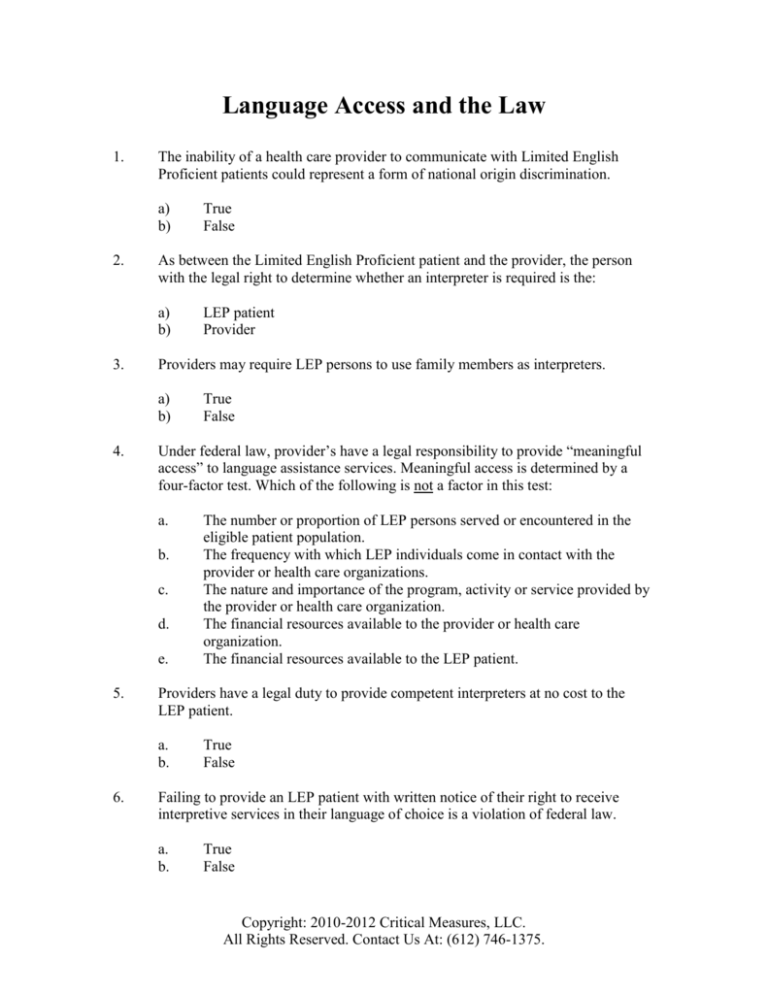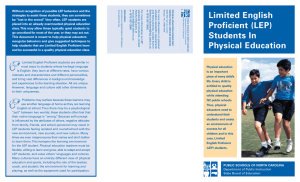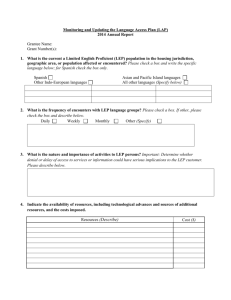
Language Access and the Law
1.
The inability of a health care provider to communicate with Limited English
Proficient patients could represent a form of national origin discrimination.
a)
b)
2.
As between the Limited English Proficient patient and the provider, the person
with the legal right to determine whether an interpreter is required is the:
a)
b)
3.
b.
c.
d.
e.
The number or proportion of LEP persons served or encountered in the
eligible patient population.
The frequency with which LEP individuals come in contact with the
provider or health care organizations.
The nature and importance of the program, activity or service provided by
the provider or health care organization.
The financial resources available to the provider or health care
organization.
The financial resources available to the LEP patient.
Providers have a legal duty to provide competent interpreters at no cost to the
LEP patient.
a.
b.
6.
True
False
Under federal law, provider’s have a legal responsibility to provide “meaningful
access” to language assistance services. Meaningful access is determined by a
four-factor test. Which of the following is not a factor in this test:
a.
5.
LEP patient
Provider
Providers may require LEP persons to use family members as interpreters.
a)
b)
4.
True
False
True
False
Failing to provide an LEP patient with written notice of their right to receive
interpretive services in their language of choice is a violation of federal law.
a.
b.
True
False
Copyright: 2010-2012 Critical Measures, LLC.
All Rights Reserved. Contact Us At: (612) 746-1375.
7.
Federal law precludes LEP patients from using family members and friends as
interpreters when receiving clinical care.
a.
b.
8.
Providers must intervene and provide an alternative form of language assistance if
they determine that the use of friends or family members as interpreters is not
resulting in effective communication. Which of the following circumstances
would require such intervention?
a.
b.
c.
d.
e.
f.
9.
If the family member or friend is not competent in English.
If the family member or friend is not competent in the patient’s primary
oral language.
If using the family member or friend would compromise patient
confidentiality.
If using the family member or friend would create a conflict of interest
with the patient’s best interests.
If the family member or friend is not proficient in the use of medical
terminology.
All of the above.
Federal law requires that each and every written document that English-speaking
patients receive must be translated into the preferred written language of the LEP
patient.
a.
b.
10.
True
False
True
False
The Department of Health and Human Services has adopted the first set of
national standards to address the delivery of culturally and linguistically
appropriate care. These CLAS standards:
a.
b.
c.
d.
mandate the provision of language assistance services but only
recommend that medical services be delivered in a culturally competent
manner.
require the culturally competent delivery of medical services but only
recommend that language assistance be provided to patients.
require both cultural and linguistic competence by providers.
none of the above
Copyright: 2010-2012 Critical Measures, LLC.
All Rights Reserved. Contact Us At: (612) 746-1375.
11.
An executive from a leading community hospital attends a seminar on cultural
competence in health care. Upon her return to the hospital, she directs the
marketing department to advertise the hospital’s “cultural competence” in Spanish
in leading Hispanic newspapers and radio stations. Juan Garcia and his wife,
Maria, see the ads and rely on them in seeking care at the hospital’s emergency
room. Unfortunately, the care they receive is neither high quality nor culturally
competent. The Garcia’s may:
a.
b.
c.
d.
12.
The CEO from a leading managed care organization returns from a seminar on
cultural competence in health care and is interested in collecting information
pertaining to members’ race and ethnicity. Before proceeding however, she asks
you, the organization’s general counsel, for a legal opinion on the legality of such
data collection efforts under federal and state law. After researching the matter,
you tell her that:
a.
b.
c.
13.
Yes
No
Must a health care provider pay for an interpreter or auxiliary aid even if the cost
exceeds the provider’s charge for the appointment?
a.
b.
15.
collection of members’ race and ethnicity data is barred under federal law.
collection of members’ race and ethnicity is permissible under federal law
but prohibited by state law in a minority of states.
collection of members’ race and ethnicity data is permissible under both
federal and state law.
Can a patient bring their own interpreter to an office visit and then bill the health
professional for the cost?
a.
b.
14.
not sue the hospital. There are no laws that preclude “puffing” in
advertising.
sue the hospital for deceptive trade practices.
sue the hospital under existing consumer protection laws.
sue the hospital under both b and c above.
Yes
No
Federal law absolutely forbids providers from allowing minor children to interpret
for their parents.
a.
b.
True
False
Copyright: 2010-2012 Critical Measures, LLC.
All Rights Reserved. Contact Us At: (612) 746-1375.
16.
The major difference between the federal legal rights of LEP individuals and the
disabled to language assistance in health care settings is:
a.
b.
c.
d.
17.
In order to protect patient privacy and confidentiality, HIPPA requires a health
care provider to obtain a patient’s authorization to use or disclose protected health
information to an interpreter.
a.
b.
18.
True
False
The Joint Commission on the Accreditation of Health Care Facilities requires
providers to collect:
a.
b.
c.
d.
19.
There are no differences. Both groups have exactly the same rights under
federal law.
Disabled individuals can personally sue providers to enforce their rights
but LEP individuals can not file a private lawsuit.
LEP individuals can personally sue providers to enforce their rights but
disabled individuals can not file a private lawsuit.
In the amount of damages that can be collected under Title VI of the Civil
Rights Act of 1964 versus the Americans with Disabilities Act.
Data on the patient’s primary oral language and preferred written language.
Data on the patient’s race and ethnicity
Both a and b above.
None of the above
The best statement of a physicians’ legal duty to provide language access to LEP
patients is:
a. Every physician is required to provide language access.
b. Only physicians who receive federal funds from DHHS are required to
provide language access.
c. Only primary care physicians are required to provide language access.
d. None of the above.
20.
Under federal law, providers are only required to provide language access
services to limited English proficient patients who are United States citizens.
Illegal aliens are not entitled to language access services.
a. True
b. False
Copyright: 2010-2012 Critical Measures, LLC.
All Rights Reserved. Contact Us At: (612) 746-1375.












